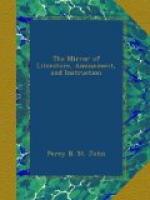As an historian, we confess that we prize him more highly than as a biographer: it is true that the same faults are apparent in both, but there is in the grand History of Napoleon more scope for redeeming beauties. His great, his unrivalled, excellence in description is here brought into full and ample display: his battles are vivid, with colours which no other historian ever could command. And all the errors of the history still leave scenes and touches of unrivalled majesty to the book.
As a novelist, Scott has been blamed for not imparting a more useful moral to his fictions, and for dwelling with too inconsiderate an interest on the chivalric illusions of the past. To charges of this nature all writers are liable. Mankind are divided into two classes; and he who belongs to the one will ever incur the reproach of not seeing through the medium of the other. Certain it is, that we, with utterly different notions on political truths from the great writer who is no more, might feel some regret—some natural pain—that that cause which we believe the best, was not honoured by his advocacy; but when we reflect on the real influence of his works, we are satisfied they have been directed to the noblest ends, and have embraced the largest circle of human interests. We do not speak of the delight he has poured forth over the earth—of the lonely hours he has charmed—of the sad hearts he has beguiled—of the beauty and the music which he has summoned to a world where all travail and none repose; this, indeed, is something—this, indeed, is a moral—this, indeed, has been a benefit to mankind. And this is a new corroborant of one among the noblest of intellectual truths, viz. that the books which please, are always books that, in one sense, benefit; and that the work which is largely and permanently popular—which sways, moulds, and softens the universal heart—cannot appeal to vulgar and unworthy passions (such appeals are never widely or long triumphant!); the delight it occasions is a proof of the moral it inspires.
But this power to charm and to beguile is not that moral excellence to which we refer. Scott has been the first great genius—Fielding alone excepted—who invited our thorough and uncondescending sympathy to the wide mass of the human family—who has stricken (for in this artificial world it requires an effort) into our hearts a love and a respect for those chosen from the people. Shakspeare has not done this—Shakspeare paints the follies of the mob with a strong and unfriendly hand. Where, in Skakspeare, is there a Jeanie Deans? Take up which you will of those numerous works which have appeared, from Waverley to the Chronicles of the Canongate,—open where you please, you will find portraits from the people—and your interest keeping watch beside the poor man’s hearth. Not, in Scott, as they were in the dramatists of our language, are the peasant, the artificer, the farmer, dragged on the stage merely to be laughed at for their brogue, and made to seem ridiculous because they are useful.




